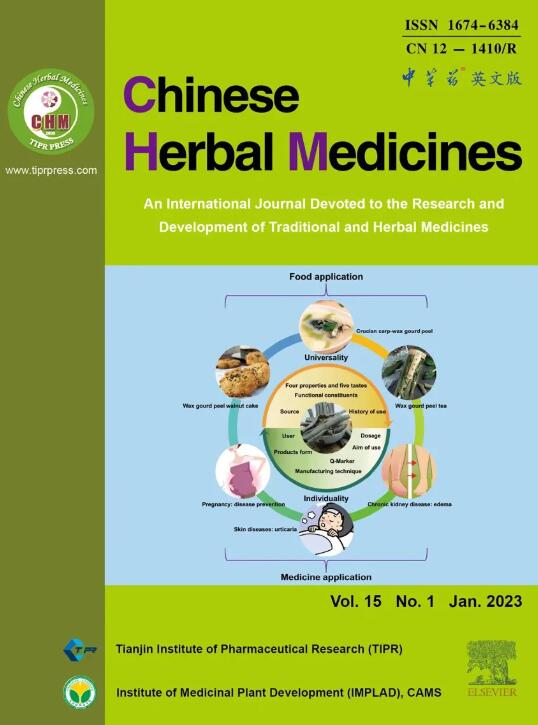原人参皂甙对肝细胞癌的作用机制及网络药理学分析
IF 8.9
4区 医学
Q1 CHEMISTRY, MEDICINAL
引用次数: 0
摘要
肝细胞癌(HCC)是全球最常见的恶性肿瘤之一,给全球医疗保健带来了重大挑战。原人参皂甙(PDs)被认为能显著改善肝脏疾病。Rg3 等人参皂甙已被开发为一类新型抗癌药物。人参皂苷 Rb1、Rd、Rg3 和 Rh2 具有有效的抗炎和抗肿瘤活性。研究证实,人参皂甙可用于治疗 HCC。然而,PDs 对 HCC 的作用机制仍不清楚。在本研究中,我们回顾了包括 Rb1、Rd、Rg3、Rg5、Rh2、Rk1 和化合物 K(CK)在内的 PDs 的抗 HCC 作用和机制。然后,我们从数据库中搜索了PDs与HCC的相关靶点,并对其进行了富集分析。随后,我们模拟了分子对接以揭示分子机制。我们发现PDs可通过多种信号通路和相关靶点治疗HCC。PDs可以抑制HCC的增殖、侵袭和转移,同时促进凋亡和诱导分化。总之,本综述和网络药理学分析为相关机制的深入研究提供了一个方向。这些见解将有助于进一步的药理学研究方向和安全有效的临床药物的开发。本文章由计算机程序翻译,如有差异,请以英文原文为准。
Mechanism of action of protopanaxadiol ginsenosides on hepatocellular carcinoma and network pharmacological analysis
Hepatocellular carcinoma (HCC) is one of the most prevalent malignancies globally, posing a major challenge to global health care. Protopanaxadiol ginsenosides (PDs) have been believed to significantly improve liver diseases. PDs, such as Rg3, have been developed as a new class of anti-cancer drugs. Ginsenosides Rb1, Rd, Rg3, and Rh2 exhibit effective anti-inflammatory and anti-tumor activities. Studies have confirmed that PDs could be used to treat HCC. However, the mechanism of action of PDs on HCC remains unclear. In the study, we reviewed the anti-HCC effects and mechanisms of PDs including Rb1, Rd, Rg3, Rg5, Rh2, Rk1, and Compound K (CK). Then, we searched for relevant targets of PDs and HCC from databases and enriched them for analysis. Subsequently, molecular docking was simulated to reveal molecular mechanisms. We found that PDs may treat HCC through multiple signaling pathways and related targets. PDs could inhibit the proliferation, invasion, and metastasis of HCC while promoting apoptosis and inducing differentiation. In conclusion, this review and network pharmacological analysis might offer a direction for in-depth research on related mechanisms. These insights will aid in the direction of further pharmacological studies and the development of safe and effective clinical drugs.
求助全文
通过发布文献求助,成功后即可免费获取论文全文。
去求助
来源期刊

Chinese Herbal Medicines
CHEMISTRY, MEDICINAL-
CiteScore
4.40
自引率
5.30%
发文量
629
审稿时长
10 weeks
期刊介绍:
Chinese Herbal Medicines is intended to disseminate the latest developments and research progress in traditional and herbal medical sciences to researchers, practitioners, academics and administrators worldwide in the field of traditional and herbal medicines. The journal's international coverage ensures that research and progress from all regions of the world are widely included.
CHM is a core journal of Chinese science and technology. The journal entered into the ESCI database in 2017, and then was included in PMC, Scopus and other important international search systems. In 2019, CHM was successfully selected for the “China Science and Technology Journal Excellence Action Plan” project, which has markedly improved its international influence and industry popularity. CHM obtained the first impact factor of 3.8 in Journal Citation Reports (JCR) in 2023.
 求助内容:
求助内容: 应助结果提醒方式:
应助结果提醒方式:


